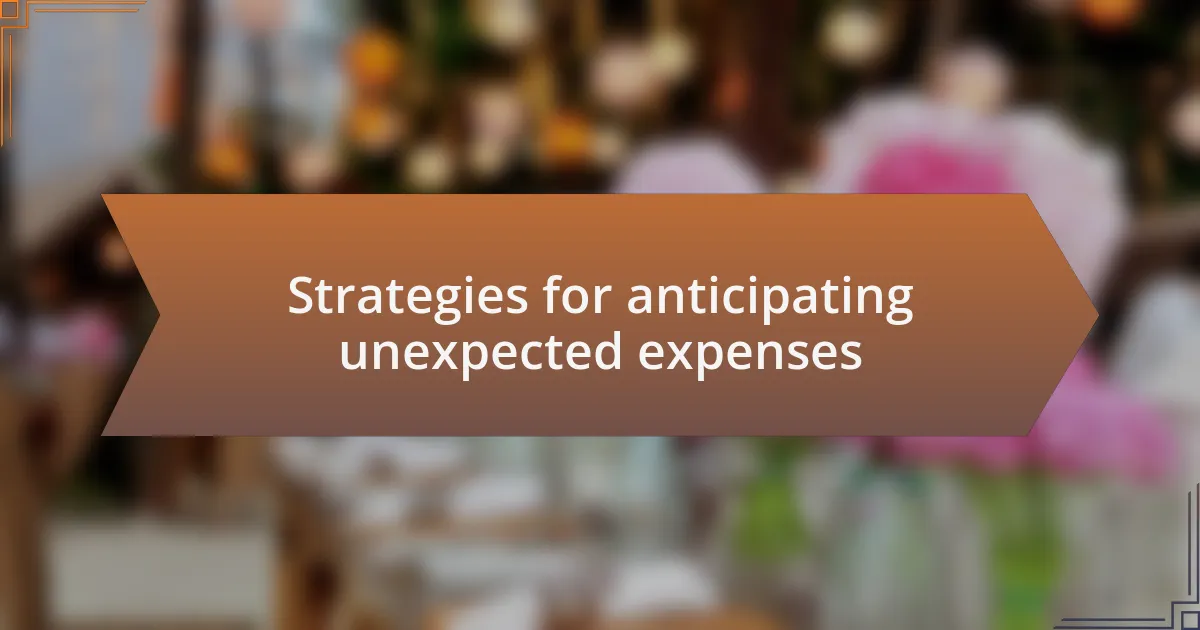Key takeaways:
- Building a contingency fund of 10-15% of the total budget helps manage unexpected expenses effectively.
- Regular communication with vendors can reveal hidden costs and prevent budget surprises.
- Thorough vendor relationships and networking can save events when unexpected issues arise.
- Viewing the budget as a living document allows for adaptability and effective response to unforeseen changes.

Understanding unexpected expenses
Unexpected expenses can really throw a wrench in your plans. I remember one time when I was organizing a corporate event, and just days before, the venue suddenly increased the rental fee. How do you handle such surprises? It’s not just about adjusting the budget; it’s about staying calm and finding solutions without compromising the event’s quality.
When I consider unexpected expenses, I think of them as a reality check in the planning process. It’s all too easy to get carried away with ideal scenarios. Have you ever found yourself so caught up in excitement that you overlook potential pitfalls? I’ve learned that taking the time to assess risks—and their possible financial impacts—can make a significant difference in managing those surprises when they arise.
I’ve found that building a buffer into your budget is more than just practical; it provides peace of mind. Reflecting on my experience, I’ve always set aside about 10 to 15% of the total budget for unforeseen costs. This cushion doesn’t just alleviate stress; it empowers you to make decisions that keep the event on track, even when life throws a curveball. What strategies have you considered to safeguard your finances in event planning?

Importance of budgeting for events
Budgeting is critical when planning events, as it serves as your financial roadmap. One time at a charity gala, I watched as the meticulous planning unraveled due to a lack of foresight in the budget. A few last-minute catering charges appeared, and it created panic. If we had budgeted for such contingencies, we could have avoided the stress entirely.
Think about the importance of tracking every detail within your budget. I’ve learned that even small expenses can add up quickly, and ignoring them can lead to significant headaches later on. For instance, during a recent workshop, I overlooked the costs for materials. As the event approached, I realized those overlooked details shifted my budget dramatically, leaving me scrambling for solutions. How often do we underestimate seemingly minor costs?
Ultimately, budgeting isn’t just about numbers; it’s about achieving your vision while remaining grounded in reality. I’ve always found that viewing the budget as a living document helps me stay adaptable. Have you considered updating your budget throughout the planning process? By doing so, I’ve been able to embrace flexibility, ensuring that I can still deliver a successful event—even when surprises pop up on the radar.

Common sources of unexpected costs
When planning an event, one of the most common sources of unexpected costs is venue-related charges. For example, I once assumed the venue’s rental fee covered everything, only to find out that setup and teardown were additional costs. It was a wake-up call for me, as I had to adjust my budget on the fly. Have you ever been caught off guard by hidden fees in a contract?
Another frequent surprise comes from last-minute changes to the guest list. During a conference I organized, added attendees needed extra seating and catering adjustments that I hadn’t accounted for. I learned that flexibility is essential, but it also comes with a price. Has a growing guest list ever caused a budget shift in your planning experience?
Moreover, unforeseen weather conditions can lead to unexpected expenses as well. I vividly remember a picnic event that quickly transformed into a rush for canopies and indoor arrangements when rain unexpectedly rolled in. This taught me the value of planning for contingencies. How prepared are you for the unpredictable nature of events?

Strategies for anticipating unexpected expenses
When it comes to anticipating unexpected expenses, proactive budgeting can make a significant difference. Early in my career, I started using a contingency fund, typically around 10-15% of the total budget, specifically for those unforeseen costs. Have you considered setting aside a portion of your budget for surprises, or do you prefer to wing it?
Staying informed about industry trends is also valuable. I remember planning an outdoor festival and hearing about a recent increase in rental prices for equipment due to high demand. This insight allowed me to secure rentals early, cushioning the blow of price hikes. How often do you check in on market rates for essential services?
Lastly, I’ve found that communicating with vendors regularly can unveil hidden costs before they arise. During one event, I chatted with a caterer about potential menu changes, and he mentioned additional fees that would apply if we made any last-minute adjustments. This conversation saved me from a budgetary headache later. Do you actively engage with your suppliers to stay ahead of potential issues?

Creating a contingency fund
Creating a contingency fund is one of the most practical steps I took in my event management journey. I learned early on that setting aside about 10-15% of the total budget specifically for unexpected costs can provide a safety net. It’s like having a financial buffer; it gives me peace of mind knowing I can handle surprises without derailing the entire event.
In planning a corporate gala, I once encountered an unforeseen venue fee because of a last-minute change in the setup. Fortunately, my contingency fund was there to cover it. I can’t stress enough how crucial it was to have that safety net—it allowed me to focus on delivering the event rather than scrambling to find additional funds. Have you ever found yourself in a similar situation?
I also recommend regularly revisiting your contingency fund, adjusting it as needed to align with fluctuating costs or additional risks. For instance, when I began organizing larger events, I realized the need to increase my fund. This proactive approach helped me feel more secure, knowing I’m prepared for whatever might come my way. What adjustments have you considered for your own fund in light of recent experiences?

Personal experiences with managing surprises
Navigating unexpected expenses has been a real journey for me. I still remember planning a wedding where the florist unexpectedly raised their prices just a week before the event. This caught me off guard, but I had built a bit of flexibility into my budget. It felt like a small victory to calmly address the situation, adjusting the decor plan without letting it overshadow the day.
Once, I faced a sudden equipment malfunction during a festival I was managing. The sound system went down, and with hundreds of attendees waiting, I felt the pressure mounting. My heart raced, but because of my contingency fund, we were able to quickly rent replacement equipment. That moment taught me the importance of staying composed under pressure—have you ever had to think on your feet to find a quick solution?
Managing surprises is often about mindset as much as it is about resources. During a charity event, I had planned everything meticulously, only to find that the catering team arrived late, jeopardizing our timeline. Instead of panicking, I leaned into the challenge, providing guests with cocktails and engaging activities while the food was prepared. In retrospect, I realize that each unexpected twist is an opportunity to adapt and grow—how do you perceive challenges in your own planning efforts?

Lessons learned from past events
Reflecting on past events, a significant lesson I learned is the power of thorough vendor relationships. At one gala, a vendor I had relied on for years unexpectedly fell through. Instead of panicking, I quickly reached out to my network and secured an alternate vendor in record time. Strengthening those connections not only saved the event but also reinforced the importance of collaboration in event management. How well do you know your vendors?
Another key takeaway came from a large corporate event where weather forecasts turned sour at the last minute. I had already accounted for some outdoor contingencies, but they weren’t enough. The rain poured down, and the planned activities had to shift indoors. This taught me to overprepare for such contingencies, thinking ahead about alternative spaces and backup plans. Have you thought of every scenario when planning an event?
Lastly, I learned the value of a debrief after each event. After one particularly challenging festival, where unexpected costs ballooned, I gathered my team and discussed what went wrong. Not only did this bring us closer, but it also created a roadmap for future events. In hindsight, what’s crucial is to view each event as a learning opportunity—are you taking time to analyze your experiences?